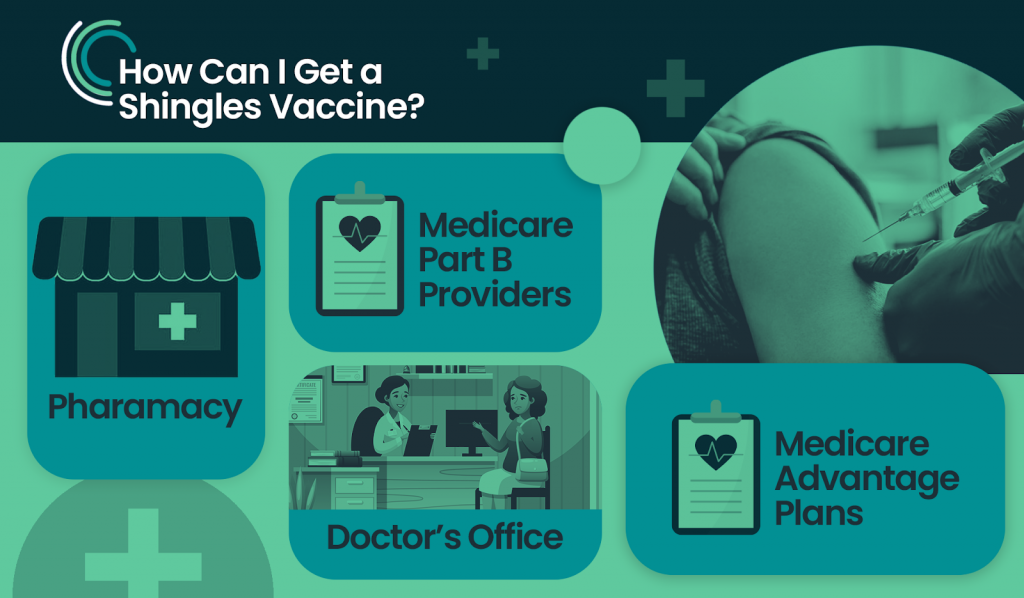Shingles is a painful viral infection caused by the varicella-zoster virus. The virus often causes a rash that develops into blisters, resulting in severe pain and potential long-term nerve damage.
Medicare recipients should prioritize preventive measures to address this critical concern. Medicare has recognized this and brought about important changes regarding shingles vaccine coverage.
Medicare Coverage of the Shingles Vaccine
Medicare Part D and select Medicare Advantage (Part C) plans, which include Part D, provide coverage for the shingles vaccine.
You can get Medicare Part D coverage for the shingles vaccine through:
- Stand Alone prescription drug plans (PDPs) or
- Medicare Advantage prescription drug plans (MAPDs).
These plans contract with pharmacies to offer the vaccine at several participating locations.
The cost-sharing for the shingles vaccine can vary depending on your Part D plan. However, Medicare has implemented guidelines to enrollees’ out-of-pocket expenses. For instance, it is compulsory for Part D plans to cover at least two commercially available shingles vaccines. These vaccines include Zostavax and Shingrix.
As for copayments, you may be responsible for a part of the cost of the vaccine, depending on your Part D plan. For example, let’s say one shot of a shingles vaccine costs $50. If your plan includes a 50% shingles vaccine coverage, Medicare pays $25 to your provider. You will have to pay the remaining $25 out-of-pocket or through your additional Medigap plan.
Was the Shingles Vaccine Always Covered by Medicare?
Before 2023, there was limited Medicare coverage for the shingles vaccine. Medicare Part D (which includes prescription drug coverage) covered the vaccine. However, the coverage was not as comprehensive as it is now.
The recent changes in the law have expanded the shingles vaccine coverage under Medicare. As of 2023, Medicare now requires Part D plans to cover at least two commercially available vaccines to prevent shingles. This includes highly effective vaccines such as Zostavax and Shingrix.
Medicare’s coverage expansion aims to ensure beneficiaries’ access to essential vaccines that safeguard against the debilitating effects of shingles.
How Can I Get a Shingles Vaccine?

Getting a shingles vaccine under Medicare is straightforward. Here are the common avenues through which you can obtain a shingles vaccine under Medicare:
Pharmacies
Several chain and independent pharmacies participate in Medicare and offer the shingles vaccine. You can visit a local pharmacy that accepts Medicare and inquire about vaccine availability. It is advisable to call ahead and confirm their participation and vaccine availability. Make sure to bring your Medicare card with you.
Doctor’s Office
Your primary care physician or healthcare provider who accepts Medicare can administer the shingles vaccine. Schedule an appointment with your doctor’s office, discuss your vaccination needs, and inquire about the vaccine’s availability. They can also provide guidance on the appropriate timing for vaccination based on your health situation.
Medicare Part B Providers
In some cases, Medicare Part B providers, such as clinics and outpatient facilities, may offer the shingles vaccine. These providers bill Medicare directly for the cost of the vaccine. Contact your Medicare Part B provider to inquire about the availability of the shingles vaccine and schedule an appointment.
Medicare Advantage Plans
If you have a Medicare Advantage plan, also known as Medicare Part C, with prescription drug coverage (Part D), you can obtain the shingles vaccine through pharmacies and doctor’s offices that participate in your plan’s network. Check with your plan provider for a list of participating pharmacies and healthcare providers.
Regardless of the chosen option, carrying your Medicare card and any relevant insurance information is essential when getting the shingles vaccine. This allows providers to bill Medicare directly and ensures that you receive the appropriate coverage and benefits.
Frequently Asked Questions (FAQs)
Can I get the shingles vaccine if I’ve already had shingles?
Yes, you can still get the shingles vaccine even if you have previously had shingles. The Centers for Disease Control and Prevention (CDC) recommends that individuals who have had shingles still receive the shingles vaccine to help prevent future occurrences.
The vaccine can reduce the risk of shingles recurrence and its associated complications. It is best to consult with your healthcare provider to determine the appropriate timing and suitability of the vaccine based on your health status.
Are there any restrictions on receiving the shingles vaccine?
The shingles vaccine is generally recommended for individuals aged 50 and older. However, there may be certain restrictions or considerations to keep in mind. Here are a few factors to consider:
Age: The shingles vaccine is approved for individuals aged 50 and older. However, specific recommendations may vary based on the vaccine brand. For example, Shingrix is approved for individuals aged 50 and older. Meanwhile, Zostavax is recommended for those aged 60 and older.
Health Status: Certain medical conditions or treatments may affect the suitability of the shingles vaccine. You should consult with your healthcare provider to assess any potential contraindications or precautions based on your health situation.
Allergies: Inform your healthcare provider if you have any known allergies, especially to vaccine components or previous doses of the shingles vaccine. They can determine if the vaccine is safe for you or recommend any necessary precautions.
Remember, it is always best to consult your healthcare provider for personalized advice and recommendations about the shingles vaccine.
Does Medicare covers other vaccines?
Each Medicare plan has different vaccine eligibility criteria. For example, Medicare Part B covers:
- Hepatitis B Vaccines,
- Influenza (Flu) shots, and
- Pneumococcal Vaccines
However, Medicare Part D coverage depends on your insurance plan.


